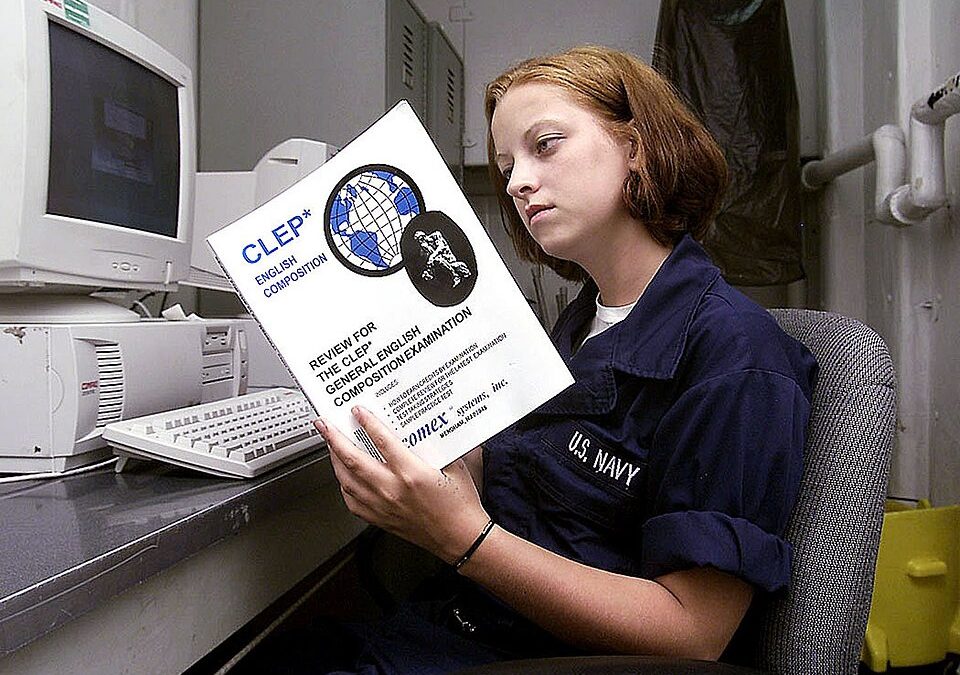The College-Level Exam Program (CLEP) may be the best deal in American post-secondary education. People who didn’t go to college directly after high school as well as other non-traditional students working full-time can earn credits at a college without taking courses if they pass CLEP subject exams. Moreover, they do this cost effectively by paying an exam fee of $97 instead of the cost of college tuition for a three-credit course, which can range from $300 or so at community college to over $5,000 at top colleges.
It’s not easy for a CLEP participant to learn enough about a subject to pass an exam when their time availability is limited. Yet millions of individuals have taken advantage of the CLEP program to earn at least part of a college degree. CLEP offers exams that earn credit for specific courses at over 2,900 participating colleges. With passing scores exams, a person can earn as many as 60 college credits, depending upon the policies of the college.
CLEP gives individuals the opportunity to demonstrate college-level knowledge that they’ve gained through prior course work, independent study, professional experience, and other life pursuits. Participants can receive credit for college courses, exemption from required courses, or advanced placement in the curriculum of a college’s degree program.
Benefits of the CLEP Program
Administered by the College Board for over 50 years, the CLEP program conducts 34 subject exams. Exams are administered throughout the year at more than 2,000 high schools, colleges, and government facilities in the United States and abroad. Individuals who participate in the CLEP program benefit in the following ways:
- They perform as well or better in subsequent courses than their classmates who took the introductory course at the same college.
- They have higher average GPA’s than their classmates.
- Exam-takers who score 50 or higher on exams have a higher rate of successful transfer from two-year to four-year colleges.
- Among first-generation college students and those in underrepresented groups, exam-takers earning a CLEP score of 50 or higher have significantly higher retention and graduation rates than their classmates.
- Exams scores are accepted for credit at far more colleges than any other credit-by-examination program.
- As an option, exams may be taken at home and administered through a remote proctoring arrangement.
Understanding the CLEP Policies of Colleges
Individuals who wish to determine how CLEP can help them at a particular college can research its CLEP policies on the college’s website. We recommend that individuals planning to take CLEP exams follow these steps:
- See if the target college accepts exams for credit. Review the college’s policies to verify that it will grant credits for specific exams.
- Determine if the exam counts toward a degree that the individual seeks. Consult the college’s degree requirements for the major to see if the exam fulfills a course requirement. At many colleges, a satisfactory score allows a person to skip a course that would otherwise be required either as a general degree requirement or as an introductory course within the major.
- Check to see if the college’s policy has any restrictions that might preclude the exam-taker’s participation in their CLEP program.
- See the Board’s CLEP College Credit Policy Search site for further information.
CLEP exam scores range from 20 to 80 points, with 50 being the minimum passing score suggested by the American Council on Education. However, each college that accepts CLEP exams for credits can set its own minimum score that may be higher than 50.
Preparing for a CLEP Exam
Study materials are available from the Board to help people prepare for exams; the Official Study Guide for $24.99 covers all exams. Single exam guides cost $14. The Board also sells previous subject areas CLEP exams with answers for $18.99.
Modern States is a nonprofit education alliance dedicated to college access for all. The alliance offers 30 free freshman-level courses that are useful as prep courses for CLEP subject exams. They are taught online by leading college professors.
Prospective exam-takers should become familiar with the descriptions of each exam on the CLEP website. They should also complete the sample questions on the “At a Glance” worksheets on the Board’s CLEP website for each exam that they plan to take.
The College Board has an online video to help exam-takers become familiar with the testing platform, testing tools, the types of examination questions, and the types of calculators that are permitted. Prospective exam-takers should practice with the scientific calculators that are the only types usable in exams such as Chemistry, College Algebra, and College Mathematics. The video also contains information about how CLEP scores are calculated.
The American Literature, Analyzing and Interpreting Literature, College Composition Modular, and English Literature exams may have optional essays if required by one of the colleges that the exam-taker has designated to receive their results. All other exams contain only multiple-choice questions. Exams take 90–120 minutes to complete, depending upon the exam’s subject area.
Taking a CLEP Exam at a Test Center
Anyone can take a CLEP exam. There is no minimum age. Exam registration and payment can be conducted on the College Board’s website, which is choice on main menu . After exam-takers register, they have six months to contact one of the more than 2,000 CLEP testing centers around the country to schedule the exam. Exam-takers may retake an exam but they cannot do so within three months of the first test.
When the exam has been completed, exam-takers immediately receive their score at the test center except for those exams that require an essay. The two designated colleges will receive scores within 10 to 14 business days. They’ll need time to record credits that are due to the exam-taker. Score transcripts for other colleges can be ordered for non-military exam-takers on the Board’s CLEP website for $20 each. Non-military exam-takers can request a transcript of their scores for $20. Military exam-takers can order transcripts for $30 through the Defense Activity for Non-Traditional Education Support (DANTES).
Exam-takers should do the following on the day of the exam:
- Bring their registration ticket,
- Bring two No. 2 pencils with erasers (no other kinds are allowed),
- Bring a valid government-issued photo ID that includes a signature, and
- Do not bring electronic devices except an allowable calculator into the test center.
Taking a Remote CLEP Exam at Home
CLEP offers all exam-takers the option of taking exams at home with remote human proctoring. These exams have the same timing, content, format, and on-screen experience as those at a CLEP testing center. Remote proctoring is provided by Verificient Technologies, Inc., which operates Proctortrack, an identity verification and remote proctoring system.
People register for the remote-proctored exam through the CLEP My Account Registration Portal on the Board’s website. One rescheduled exam appointment is allowed at no additional charge. There is a charge of $10 for rescheduling additional appointments. Exam-takers need to download and install the ETS Online Test application. This will be used for the exam so that the proctor can log the exam-taker in to start the exam.
To take an exam with remote proctoring, an exam-taker must meet the following criteria:
- Be located in the U.S. (excludes U.S. territories) or be funded by DANTES.
- The computer and testing room must meet equipment, environmental, and Proctortrack requirements for remote proctoring.
To participate in remote proctoring, an exam-taker must have the following:
- A computer (Windows-compatible PC’s only, no Macs),
- A webcam,
- A speaker,
- A microphone,
- A white board or one sheet of paper in a transparent sheet protector,
- A dry-erase marker for note taking, and
- A quiet, secure testing environment.
Exam-takers who have a learning or physical disability that would prevent them from taking a remote-proctored CLEP exam under standard conditions may request accommodations through the College Board’s Services for Students with Disabilities. The following accommodations are available for remote-proctored exams:
- Screen magnification
- Modifiable screen colors
- Extended time
- Untimed rest breaks (in view of the proctor)
- Accommodations that don’t impact the testing platform and allow the exam-taker to stay within view of the proctor, such as permission for food, drinks, medication, and permission to test blood sugar.
CLEP as a Military Benefit
To help military service members as well as eligible spouses and civil service employees reach their educational goals at no cost, the U.S. government fully funds CLEP exam fees.
DANTES is the delivery channel for these educational services. Benefits are available to:
- Military personnel: Available to members of the Army, Navy, Marine Corps, Coast Guard, Army Reserve, Air Force Reserve, Marine Corps Reserve, Navy Reserve, Coast Guard Reserve, Army National Guard, and Air National Guard.
- Spouses of:Coast Guard and MyCAA Military Spouses.
- Civilian employees of:Air Force.
- Veterans:Veterans eligible for education benefits under the Forever G.I. Bill.
CLEP Exam Topics
Below are the five CLEP Topics and the Subject Area Exams under each.
- Composition and Literature:
- American Literature
- Analyzing and Interpreting Literature
- College Composition
- College Composition Modular
- English Literature
- Humanities
- World Languages:
- French Language: Levels 1 and 2
- German Language: Levels 1 and 2
- Spanish Language: Levels 1 and 2
- History and Social Sciences:
- American Government
- History of the United States I
- History of the United States II
- Human Growth and Development
- Introduction to Educational Psychology
- Introductory Psychology
- Introductory Sociology
- Principles of Macroeconomics
- Principles of Microeconomics
- Social Sciences and History
- Western Civilization I: Ancient Near East to 1648
- Western Civilization II: 1648 to Present
- Science and Mathematics:
- Biology
- Calculus
- Chemistry
- College Algebra
- College Mathematics
- Natural Sciences
- Pre-calculus
- Business:
- Financial Accounting
- Managerial Accounting
- Information Systems
- Introductory Business Law
- Principles of Management
- Principles of Marketing


Recent Comments